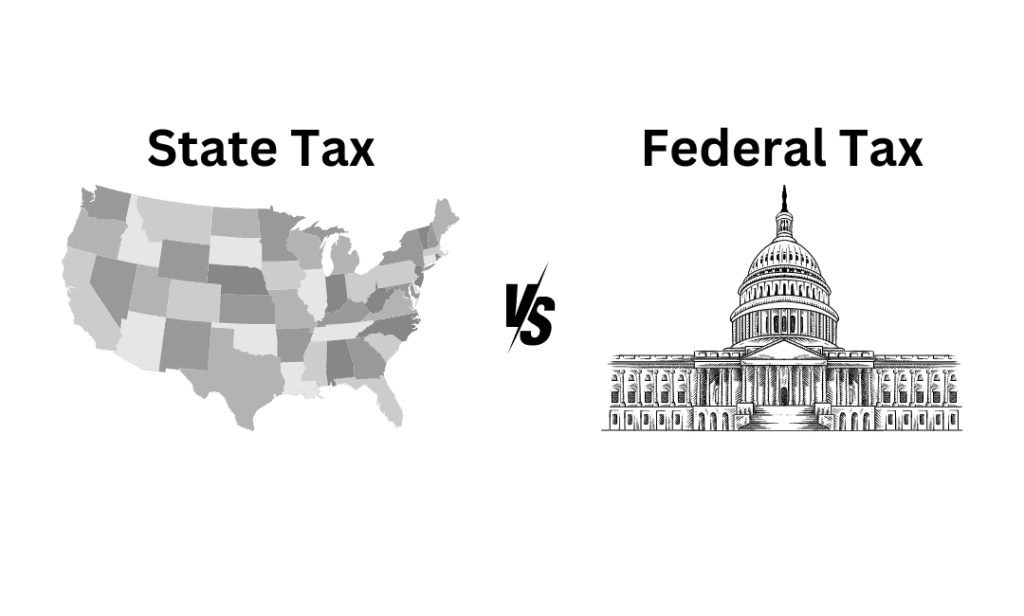As a business owner, understanding the differences between state and federal taxes is crucial for effective financial management.
Each operates under its own set of rules, rates, and filing requirements, which can become complex if your business operates in multiple states.
This guide will help you understand the key differences between state and federal taxes, how to manage both, and strategies to ensure compliance in every state where you do business.
1. Understanding the Key Differences Between State and Federal Taxes
The federal government imposes taxes on businesses to generate revenue for national purposes, such as defense, healthcare, and social security.
These taxes include income tax, employment tax, and excise taxes, among others. States, on the other hand, collect taxes to fund local infrastructure, education, and public services.
While federal taxes apply uniformly across the U.S., state tax regulations vary significantly from state to state.
- Federal Taxes: These are administered by the IRS and include federal income taxes, payroll taxes, and taxes for specific business activities. The federal tax rate is progressive, meaning it increases as income rises.
- State Taxes: These vary widely depending on the state. Some states impose an income tax, while others, like Florida and Texas, do not. States may also impose additional taxes, such as franchise taxes, sales taxes, or excise taxes.
Pro Tip: Always check the specific tax requirements for the states where your business operates, as they can differ significantly.
2. How to Manage Both State and Federal Taxes for Your Business
Managing state and federal taxes requires careful planning and an understanding of how each tax system works.
To avoid mistakes, it’s essential to keep your financial records organized and up to date.
Here are a few steps you can take to effectively manage your state and federal tax obligations:
- Separate State and Federal Tax Liabilities: Keeping separate records of your state and federal taxes helps you avoid confusion during tax season. Use dedicated accounts or software to track payments and filing deadlines for both.
- Understand Your Filing Requirements: Federal taxes are typically filed annually, while state taxes may have different filing requirements depending on your business’s location and revenue. Some states require quarterly filings for sales taxes or estimated income taxes.
- Leverage Tax Software: Using tax software or working with a tax professional can help you stay organized, automate calculations, and file your taxes on time. Most software solutions will handle both state and federal tax filings for you, making the process easier.
Pro Tip: Automating your tax filing processes with professional software can save you time and help prevent errors.
3. Strategies for Ensuring Compliance in Multiple States
If your business operates in more than one state, you will need to comply with the tax regulations in each state where you do business.
This can be particularly challenging for remote or online businesses.
Here are a few strategies to help you stay compliant:
- Understand Nexus Rules: Nexus refers to the connection between a business and a state that triggers tax obligations. A business typically has nexus in a state if it has physical locations, employees, or generates sales in that state. It’s important to know where your business has nexus to avoid penalties for non-compliance.
- Track Sales and Use Taxes: Many states require businesses to collect sales taxes on goods or services sold within the state. In states with a use tax, businesses may also need to report out-of-state purchases that weren’t taxed at the time of sale.
- Register in Multiple States: If your business operates in multiple states, you’ll need to register with the tax authorities in each state where you have a taxable presence. This includes filing tax returns and paying state income taxes where applicable.
- Consult with a Tax Professional: Managing taxes across multiple states can be complex, especially as tax laws evolve. Working with a tax professional ensures that you stay compliant with both federal and state tax laws.
Pro Tip: Nexus laws vary by state, so it’s important to review each state’s guidelines to determine your tax obligations.
Take Action Today
Managing state and federal taxes can be challenging, but with the right tools and strategies, it doesn’t have to be overwhelming.
By staying organized, understanding nexus laws, and leveraging tax software or professional assistance, you can ensure your business remains compliant and avoids costly penalties.
Need Help?
Our team at BadranTax specializes in helping businesses navigate complex state and federal tax regulations.
Whether you operate in one state or many, we provide expert guidance to help you manage your tax obligations effectively.
Schedule a free consultation today to learn how we can assist with your state and federal tax needs.
Additional Resources:






